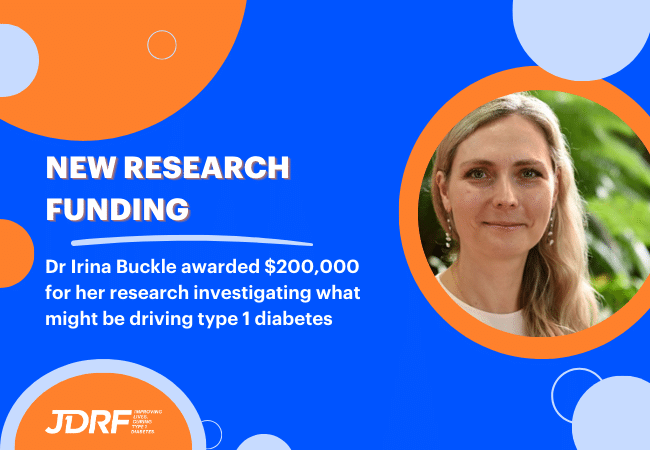Supporting your teen through the challenges of T1D

Adolescence comes with its own set of new challenges for any parent, but what is it like if your teenager also has type 1 diabetes (T1D)?
Dr Adriana Ventura spoke at JDRF’s Type One Summit on the psychological impacts of T1D during the teenage years including diabetes burnout, planning their transition of care, and lots more. Read Dr Ventura’s insights below.
Dr Adriana Ventura is a nationally registered psychologist who has worked in a variety of settings, including the not-for-profit sector, public and private hospitals. For six years, she worked as a Research Fellow at the Australian Centre for Behavioural Research in Diabetes (ACBRD). Dr Ventura’s research focuses on the psychological, social and behavioural aspects of living with type 1 and type 2 diabetes, her special interest area.
Every day, Dr Ventura sees people with T1D – and their families – who experience high levels of stress. Having T1D can put individuals at an increased risk of experiencing mental health issues as well. Some common mental health issues in people with T1D are depression, anxiety and eating disorders. While these may or may not be related to T1D, they can have an effect on diabetes management.
“Certainly not everyone with T1D needs to see a psychologist and not everyone will develop a mental health condition. But at some point, most people will experience stress and perhaps need some support with managing their T1D”, Dr Ventura said.

Transition planning is key
T1D places significant self-care and psychological demands on teenagers and their families. We know that optimal T1D care is often compromised during this time, which can lead to early onset of complications. Dr Ventura said that part of this may have to do with the healthcare support young people receive as they transition into early adulthood. Around 30-40% of young people report becoming lost in transition from paediatric to adult diabetes care.
In one survey, when parents were asked whether their teens doctor or educator had talked with them about their teens transition from pediatric to adult diabetes services 45% of parents reported that their teen did not have a transition plan in place. Additionally, 38% had not discussed finding an adult healthcare team and 43% had not discussed how their teens healthcare needs might change as they transition to adulthood. These statistics highlight that many teens aren’t getting enough support to ensure a smooth transition into the adult healthcare system.
>> Read Dr Ventura’s 10 tips to help support your teen living with T1D
What is diabetes distress?
We also know that the psychological demands on young people are huge, which can influence T1D management. Approximately one third of young people with T1D are known to need mental health support. So, what is it that is so distressing for teens? ACBRD research has highlighted some common themes – the pressure of keeping it all together, feeling different, every day is a struggle, feeing frustrated/confused/angry when levels go high or low, and feeling annoying to be constantly checking blood glucose levels.
It’s common for people with T1D to feel a range of emotions about having the condition: anger, frustration, embarrassment. This is known as diabetes distress. Diabetes distress is defined as the emotional response to living with and managing T1D. A mild degree of distress is normal, and distress will fluctuate over time, for example, when life becomes more challenging or changes in treatment or other life stresses occur. It is when distress becomes severe that it needs to be addressed.
There are lots of aspects of T1D that can causes distress. The Diabetes MILES youth study surveyed more than 700 young people with T1D and their parents. The most serious problem areas found among teens were: ‘feeling my friends and family don’t understand’, ‘worrying about weight’, ‘feeling upset when management is off track’, ‘worrying about future and complications’, and ‘not feeling motivated to keep up with daily management’.
The MILES study also found that 1 in 5 teens indicated they felt severe diabetes distress. Severe diabetes distress is when the emotional response goes beyond what’s considered normal and begins to have a negative impact on way teens manage T1D and other aspects of their lives. Girls typically report poorer emotional wellbeing and quality of life than boys, particularly around concerns with food and eating. A continuous high level of distress is associated with elevated HbA1c, less frequent blood glucose checks and can lead to unhealthy eating behaviours. For some teens, diabetes distress can lead to diabetes burnout.
From distress to diabetes burnout
Diabetes burnout is a state of physical and emotional exhaustion caused by the the continuous distress of diabetes. It can present as:
- disengagement from self-care tasks
- unhealthy or uncontrolled eating
- risk-taking behaviour e.g. drugs, alcohol, smoking
- non-attendance at appointments.
Diabetes burnout can result from a teen feeling they have too much responsibility for their T1D management. Burnout is serious and requires professional support. It is not a form of normal teenage rebellion – most teens genuinely do care about their health and T1D, but diabetes burnout is when it just becomes too much for them.
It’s important to distinguish diabetes burnout from disordered eating. Particularly in teenage girls, burnout can mask eating disorder behaviour including skipping insulin to lose weight. This behaviour needs immediate attention from a health care professional.
For parents, it can be hard to determine what’s normal teenage risk-taking and what’s diabetes burnout. Peer relationships have a lot to do with whether teens will engage in risk-taking behaviours. This is because teens experience far more distress than adults do when they are excluded by peers. This means they may take more risks to prevent this. The teenage years are a stage where young people place large amounts of importance on peer relationships. No teen wants to feel different to their friends.
Diabetes distress is for parents too
Diabetes distress extends to parents, and the rate of severe diabetes distress in parents is comparable. Nearly one in five parents of children aged 10-19 reported severe diabetes distress. As a parent, your health and wellbeing is important too!
“Address these concerns if you have them. For example, if you’re not sleeping at night because you’re so worried or it’s really impacting on daily functioning, that’s when it needs to be addressed.”
Parents reported feeling: stressed and unsupported, that it’s very difficult to let go and allow their child to manage diabetes on their own, worried for their child’s future health, that T1D is a constant struggle and juggling act, and that they wish people knew T1D is not caused by lifestyle.
Download JDRF’s Teen Toolkit. This resource was developed by experts to help carers assist teens in their growth and development. It includes practical advice on day-to-day life with T1D and the typical circumstances families may find themselves faced with.




